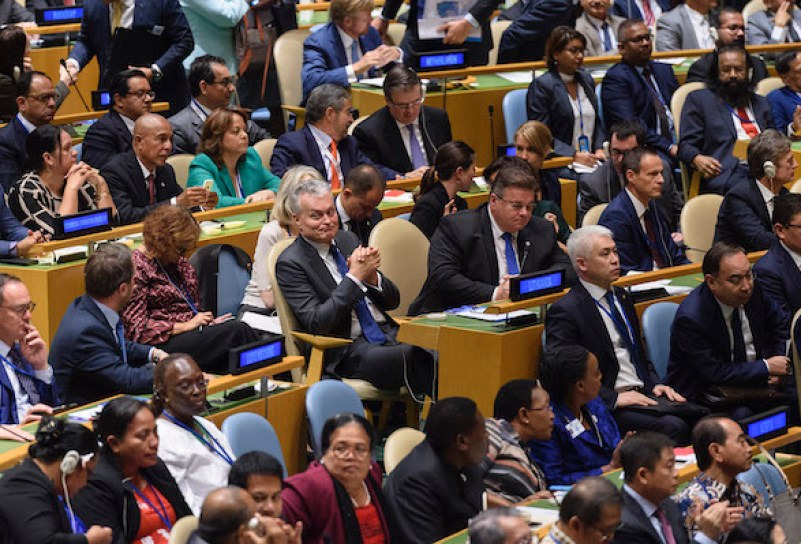From the start, the Lithuanian President made it clear that “I came with the message that my country is deeply committed to the UN core values and principles. The responsibility to seek peace, to protect human rights, and to work towards general welfare is our main goal, rooted in our difficult history.”
Perhaps, one of the strongest parts of the newly-elected Lithuanian President’s statement was when Gitanas Nauseda explained, “Lithuania suffered painful losses during the two world wars. It experienced two brutal totalitarian regimes, Nazism and Stalinism. After regaining independence almost 30 years ago, we rebuilt democratic state institutions, created an effective market economy and became part of the world’s major political, economic, and cultural organizations.
In addition, President Nauseda emphasized that “history is a great teacher. It teaches us not to repeat the mistakes of the past. It also inspires us to move on to new heights. Just a month ago, we commemorated the 80th anniversary of the infamous Molotov-Ribbentrop Pact. This criminal conspiracy led to World War II and the occupation of the three Baltic States. The same day we also celebrate a moment of great triumph. Thirty years ago, the people of Lithuania, Latvia and Estonia joined hands in a 650-kilometer long Baltic Way, condemning the Pact. This was an important step in our struggle for freedom and we will never forget it.

The President went on to say that “Memories about grievances of the past – about testimonies, about the crimes still committed today induce us to act. Everybody has the right to feel secure and pursue personal happiness. Everyone is entitled to live in a world based on the rule of law and respect for human rights. And we have a duty to deliver these rights.”
In his speech before the GA, the Lithuanian President pointed out that “Unfortunately, in the world of many crises, Europe is not an exception any more. The illegitimate use of force and serious violations of sovereignty, independence, and territorial integrity have become part of Europe’s everyday life.”
The Lithuanian President emphasized in particular, during his remarks that “Russia, a permanent member of the UN Security Council, encouraged by the feeble international response to its 2008 aggression against Georgia, attempts to further destabilize countries in its near neighborhood. Russia’s appalling military actions against Ukraine have been continuing for five years now.”
In addition, Gitanas Nauseda, the President of Lithuania, made it clear that “Lithuania strongly condemns the prolonged violation of international law and urges the aggressor to respect the UN Charter, the Helsinki Final Act and bilateral agreements with Ukraine. We will continue supporting Georgian and Ukrainian independence, sovereignty, and territorial integrity. We will never recognize the illegal annexation of Crimea, the occupation Minsk agreements is an absolute precondition for normalizing relations with Russia.”
In looking back, the President of the Lithuanian Republic said, “We have to remember the hard lessons of history. There was a time when left-leaning intellectuals congratulated Vladimir Lenin’s ascent to power during the Russian Revolution. There was a time when the independent-seeking Baltic States were being instructed not to rush so as not to harm Mikhail Gorbachev’s Perestroika. Both times it all ended in a bloodshed of innocent people.”
The Lithuanian President went on to say, “As a matter of principle, we should not endorse unions in which some states become subjects of history, and some others – merely objects. As of today, Russia has done nothing to inspire our confidence. Could this yet change? Yes, we could be the first to congratulate this turn of events -a democratic Russia respecting international law and the sovereignty of other countries.”
On the subject of justice, the Lithuanian President wrapped up his remarks as a speaker in this year’s UN General Assembly, with the following observations: “Some political leaders are raising an idea to create a new geopolitical space from the Atlantic Ocean to Vladivostok. Drawing Russia in it may sound interesting, but do we have common ground for it? Do we have shared values? The answer is No! “
Regarding justice, Lithuanian President Gitanas Nauseda stated: “Lithuania is one of these countries that is still waiting for justice. During the brutal January events in l991, Soviet military tanks attacked peaceful protestors in newly independent Lithuania. Fourteen civilians were killed and more than 800 injured.” He added, “28 years ago, the Lithuanian court convicted sixty-seven former Soviet officers and military for war crimes against humanity. However, Russia continues to shield the perpetrators from justice and has even initiated criminal proceedings against those Lithuanian judges and prosecuted who investigated the case. We see it as impermissible interference in a sovereign state’s delivery of justice.”






























Comments